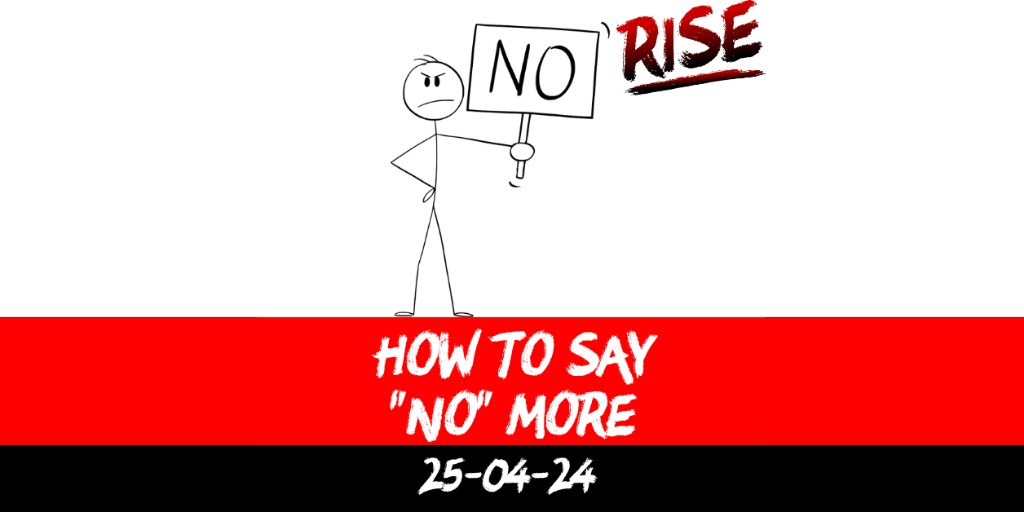I’ve talked a lot recently about how to reassign that finite resource we have known as time.
Remember – it’s not something we can “make” or “create”.
We all have the exact same amount.
And I completely get that we may all have varying volumes of different things that need to be done in that time.
But I also get, both from my own experiences as a human and over 20 years in this industry……….
That we, at the very least, have control over how we assign a reasonable proportion of that.
Maybe not all, sure.
But probably more than we’re telling ourselves.
And often parts of the issue can be that we’ve just said “yes” to too much stuff.
If I were to ask you if you think you’d benefit from saying “no” more often………
I’m assuming most of you would say that you would.
And saying no is something we’ve never really been taught to do.
It sounds so obvious that we don’t even realise that there’s anything we could learn about it.
“I just need to say no more” we might tell ourselves.
And, sure, that is true.
But I’m sure it’s probably also true that if we approach it in that same way as we have before then nothing will change.
As with everything that we do or don’t do there are two considerations.
Skillset and willset.
The actual techniques, abilities and processes that go into doing the thing (which I’ll cover tomorrow).
And how we think and feel about doing it.
Because, often, we kind of think that we should say no to something
But we also kind of want to do it.
So here’s a quick technique that can change how you feel about doing that thing or not.
I want you to write down 10 drawbacks to saying “Yes”.
Actually write them down.
Pen and paper.
Don’t kid yourself that “I’ll do it in my head”.
Because, remember, “I’ll do it in my head” is just code for “uncommitted”.
Write down those 10 drawbacks to saying “Yes”.
I’ll wait…………………
….
….
….
….
Actually done that and not just scrolled down?
You might as well stop reading now if you just scrolled down.
If you’ve written that list now write down 10 benefits to saying no.
Again, I’ll wait…………………
….
….
….
….
Now I want you to challenge what you think are the downsides of saying no.
For the thing that you’re considering, complete the following sentence (on paper, not in your head);
“If I say “no” to _________, that means ________”
Eg:
“If I say no to drinking, that means it’ll be boring”
“If I say no to dessert, then people will take the mickey out of me”
“If I say no to overtime, I’ll get passed on for promotion”
“If I say no to special rates, I’ll lose money”
“If I say no to NAME, they won’t talk to me for days”
Then give that a ‘turnaround’.
Change what it means to something opposite that you also believe to be true.
“If I say no to drinking, then I’ll have more energy, time and money to do things I enjoy and value”
“If I say no to dessert, then people will probably barely notice and any comments are their issue”
“If I say no to overtime, I’ll set clear boundaries, have time for other things that are important to me and will find ways to justify my promotion that don’t just require yet more time”
“If I say no to special rates, people will respect my pricing, I won’t feel devalued and annoyed and I’ll get full paying clients who are always more committed”
“If I say no to NAME, then they’ll understand”
Again, actually go and do these.
Write down all of the above.
Refer back to it.
And see how it changes your mindset around saying no in that particular situation
And tomorrow, I’ll cover the (surprisingly numerous) ways that you can actually say “no”.
Much love,
Jon ‘Limit Soldier’ Hall
P.S. Saying “Yes” to our four week trial will change your life you know? www.myrise.co.uk/apply
——————————————————————-
RISE in Macclesfield was established in 2012 and specialise in Group Personal Training weight loss programmes for those that don’t like the gym and find diets boring and restrictive!
